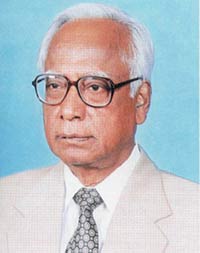Bangladesh president Iajuddin Ahmed stays in the post
President of Bangladesh Iajuddin Ahmed will stay on in the post until an elected parliament appoints a successor, a top interim government official said Wednesday.

Ahmed handed power in January to a military-backed interim government that has vowed to clean up the country's corruption and its often-violent factional politics before holding new elections, expected some time before the end of 2008.
Under the constitution, Ahmed's term as president normally would end on Sept. 5, said Mainul Hosein, the interim government's adviser in charge of overseeing the Law Ministry and Information Ministry.
However, "the constitution also says that he will have to continue until his successor is elected, after an elected government takes over," Hosein said, adding that the caretaker government "would never violate the constitution."
The interim government has detained two former premiers who head the country's two largest political parties - Khaleda Zia and Sheikh Hasina - on corruption charges in its drive to stamp out graft and undermine the political elite. Zia was arrested Monday, and Hasina has been detained since July. Both deny corruption charges, saying they are politically motivated.
Officials have promised to hold new elections after a new voter list is completed, expected sometime before the end of 2008.
Ahmed, 76, a former university professor who was briefly hospitalized last year for a heart condition, has not commented about staying on in office.
Ahmed canceled national elections scheduled for last January following months of violent street protests led by opposition political parties alleging voter registration discrepancies.
The president's duties normally are mostly ceremonial, but Ahmed's role increased last October when he stepped in to oversee national elections.
Under the constitution, a nonpartisan interim administration, usually headed by a former chief justice, has to take over from an outgoing elected government to conduct the next elections. But when former chief justice K.M. Hasan declined, Ahmed filled the gap.
But as opposition protests demanding electoral reforms continued to disrupt the country, the president suspended the scheduled January elections, declared a state of emergency and handed over power to the military-backed, interim government headed by a former central bank governor.
Subscribe to Pravda.Ru Telegram channel, Facebook, RSS!





